Season 7, Episodes 1 and 2: “The Sixth Extinction”/“The Sixth Extinction II: Amor Fati”
Original Airdates: November 7 and 14, 1999
What happens when you care about a show, and it doesn’t care back? I mean that happens all the time, let’s be honest, shows don’t care about us. They are shows. We are people. It is a one-sided relationship and yet, you hope. That what you invest will mean something, and, in the case of these episodes, you hope that you have enough investment to give. “The Sixth Extinction” and “Amor Fati” want a lot from you. Primarily they want tolerance, and attention. They have some sort of story to tell but it is big and it is wild and it is, quite often, very silly. So then, we have to ask ourselves. Is it okay to stop caring?
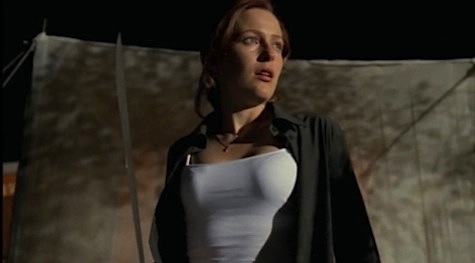
I guess I’m being dramatic but look, the show started it. Season Seven’s opener is overwrought and ridiculous, and not just from a content perspective—because look, at this point, I’m fairly willing to believe anything. Ancient astronaut theory, fine, the aliens wrote the Quran and also our DNA, I got it. Mulder might suddenly be an alien-human hybrid (thanks Tunguska!), okay, I guess that might be true. But these plot points are delivered in such an inelegant fashion that one almost wonders if the show itself cares about the information it’s delivering.
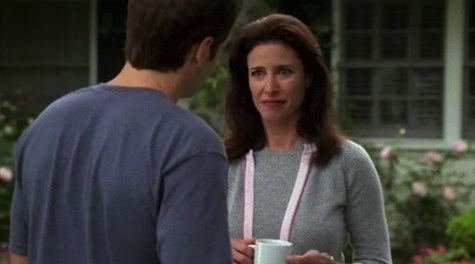
The primary example of this is Mulder’s Last Temptation of Christ, aka “Amor Fati,” aka oh for heaven’s sake. So basically what we have here is, Mulder’s in a coma, and he coma-dreams a whole life for himself, a thing where the Cigarette-Smoking Man saves him and he gets to live a perfect life with Diana Fowley and they have babies and then she dies and then he gets old and meanwhile the apocalypse is happening and he has no idea, whoops!
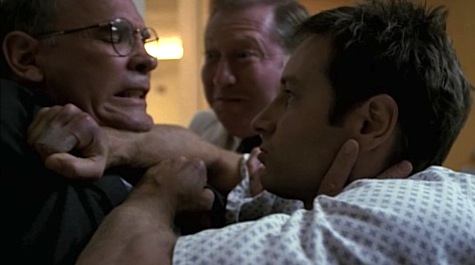
The X-Files has always loved a dream sequence, and this one is a real clunker. Not only is the metaphor laid on thick as can be, the conclusion—Scully appears to Mulder and yells at him for taking the easy path—appears to be serving a story I didn’t notice was getting told. Was Mulder doubting himself and/or his fight? Because the last time we saw him conscious, he was his old self, arguing with Scully, not in any way wishing he was off The X-Files. If anything, this seems to be a thread I thought we tied up after Season 5, a Mulder-questions-his-life’s-work situation. If anything, this seems to be an excuse to use some big words and Significant Imagery.
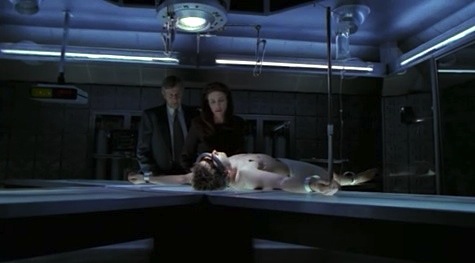
The non-dream-sequence of events in “Amor Fati” are just as strange, just as reaching. While Mulder lies tied to a cross(-shaped operating table), the Cigarette-Smoking Man undergoes a procedure to get some of Mulder’s hot hot alien immunity all up in ‘im. This, at least, is an extension of an active thread—the need for some lucky human to go hybrid so that he or she can survive the coming colonization. But, again, the telling is clunky. The Cigarette-Smoking Man all but cackles as he prepares for the operation, all mwah-hah-hah I will survive. Meanwhile, Diana Fowley—up until this point nothing but a scheming villain—is the one who backs off, grows a heart, and gives Scully the means to save her partner. For her trouble, Diana is murdered (offscreen!), a warning to any other half-realized character who might get between our agents.
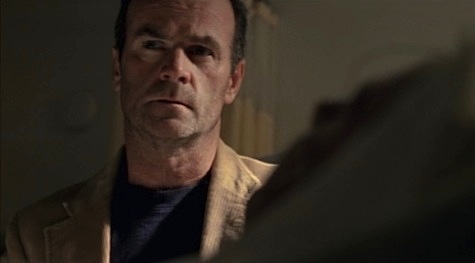
“The Sixth Extinction” is more tolerable than its sequel, if for no other reason than that “The Sixth Extinction” is pretty much just killing time. The show has always struggled to keep its three-part arcs taut, and here it’s as though they’re trying to keep us distracted with tricks, many of which are not particularly relevant by the time “Amor Fati” comes along. Much of the episode is devoted to Skinner’s failed attempt to save Mulder. At Mulder’s groggy request, Skinner brings in a surly, out-of-work Kritschgau (another sign that these episodes owe more to the “Redux” era than anything more recent), who identifies Mulder’s condition as one similar to test subjects he once worked with at the C.I.A. Kritschgau has Skinner inject Mulder with drugs that make him lucid enough to tell Skinner that he knows about Krycek and the nanobots (thanks alien psychic powers!), Skinner looks depressed about it, then Mulder has a seizure and Fowley shows up and everyone appears to give up all at once, waiting for the next episode to come and clear things up.
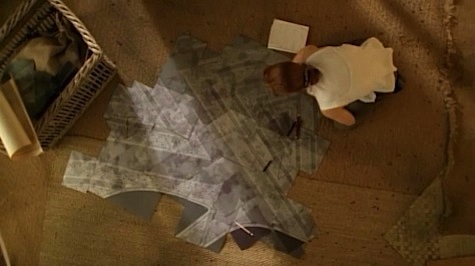
Of particular disappointment is the resolution of Scully’s time in Africa. She spends a good long time piecing together rubbings of the alien craft, working with a local biologist to translate the symbols, looking super-shocked when they find passages from all sorts of religious texts and descriptions of human genetics. And this is pretty exciting, this is good stuff, this is Scully really digging into an outer-space-mystery instead of running away from one. Her work is disrupted by signs—a plague of locust-like insects that attack her, a sea that boils and then runs blood-red, an visions of a man who warns her against her work, and then disappears. All this plus the appearance of the batcrap crazy Dr. Barnes eventually drive Scully out of Africa, back to Mulder’s side, where she appears to be of more use clutching his hand and telling him to pull through.
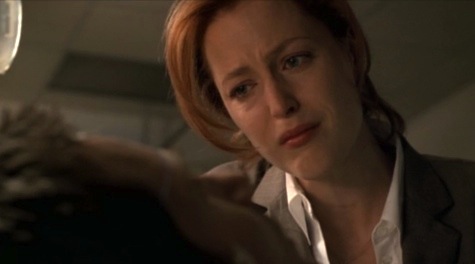
Meanwhile, back in Africa, Crazy Dr. Barnes discovers that the craft has the power to re-animate the dead. He tests the theory by murdering his driver, then his driver proves the theory by coming back to life and murdering him. And then the alien craft disappears. This is all decent enough entertainment (zombie driver!), but the second Scully leaves the Ivory Coast is the second that this business ceases to be embedded in the rest of the story. It’s unclear if Mulder or Scully know about the craft’s disappearance, or know about its power of reanimation (Scully is there when Barnes figures out that it can wake the dead, but she’s maybe too busy knocking him out with a chair to really process it). It’s unclear if the things Scully has learned will be pursued, at all.
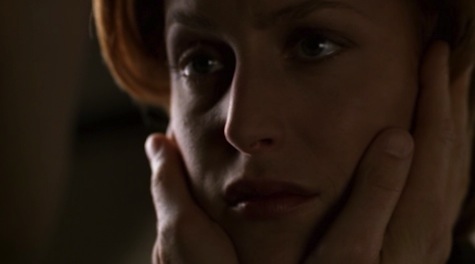
The fact is that as wildly wild as the ancient astronaut/key-to-everything-spacecraft storyline is, it’s going to come off bad unless it can be tied into the (very few!) characters we care about. While in Africa, Scully voiceovers about how she’s working on cracking this code because she wants to save Mulder, but ultimately, the craft has nothing to do with Mulder’s recovery. Sure, she storms back to the United States confident that Mulder is being affected by something extraterrestrial, sure, that’s different. But from a structural-plot perspective, without a cure or idea in hand, she’s wasted her time piecing rubbings together. You could give me episode after episode of the truth, but unless my agents learn—and use—the truth themselves, it’s of no use to your loyal viewer.
Meghan Deans asked you not to involve her in this. She Tumbls and is @meghandrrns.










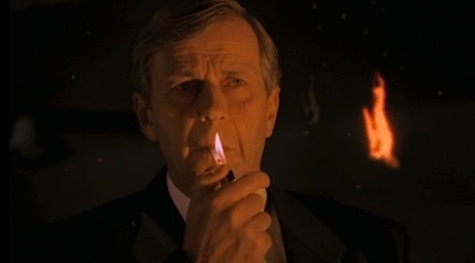
this Episodes seem to be Mr.Carter using the Zacheria Stichin’s novel to make a plot point,that life on earth was created by some alien life.My biggest problem with episode is that scully is out in africa translating the Words on the ship and we just leave it alone for the rest of the series,atleast you would think that the alien bounty hunter would be the one to hunt her down to stop the translating
I wonder how much the Scully plot line is hurt by the fact that “Amor Fati” is written by David Duchovny with Chris Carter.
And the issue of Mulder’s doubt via “the path not taken” ala Jesus in The Last Temptation of Christ is possibly brought in to affirm his full acceptance (amor) of his actual life (fati), ala Nietzsche, not simply bearing necessity but embracing and loving it.
It’s unclear if the things Scully has learned will be pursued, at all….You could give me episode after episode of the truth, but unless my
agents learn—and use—the truth themselves, it’s of no use to your loyal
viewer.
Amen. And amen. Well said. As much as I love this show, I think this criticism could be applied to pretty much its entire run.
@1: atleast you would think that the alien bounty hunter would be the one to hunt her down to stop the translating
Yeah, exactly. Waaaay back at the end of season 1, “they” killed off the doctor from Georgetown Microbiology that worked with Scully to identify the alien/three-strand DNA pretty much immediately after they realized it was weird. Seems like the writing on the ship would be at least as important.
I actually like the fact that the modern aliens have little to nothing to do with this plotline. The ship is what, 250,000,000 years old or more? They probably had no idea it was there and no idea that it is being investigated by Scully. Now that their human conspiracy connection is gone, they are much further out of the loop.
“What happens when you care about a show, and it doesn’t care back? Is it okay to stop caring?” Wonderful thought, and yes, it is/was perfectly fine to stop caring. For me, it was quite “freeing”, in fact.
You’ve done a great job moseying on down TXF memory lane; thanks for taking the time to do so and to share the experience with similar minded folks. I’ve done the same every couple of years or so since disconnecting from the show at the end of Season Eight. (Of which I only tuned in to the episodes in which Mulder was featured; I know very little about the rest of the show from that time forward and did not see the second movie.) The show and I did not part on good terms, so to speak, but I saw the end (of my relationship with it) coming all along. I actually embarked on a brief fanfic writing career during the original airing of seasons six, seven and eight, when it became obvious that the creators of this show didn’t even know how best to “make it up as they go along”. It was ultimately very satisfying for me to take these characters on a journey that I thought they deserved, especially after all the time I had invested in watching them. Along the way, I discovered that I had plenty of company in how I thought and felt.
I haven’t gone through all of your recaps but I’ve enjoyed the ones that I’ve read; I will probably get around to reading them all – except the ones about the eps that I never saw. TXF was a great show in its prime and definitely made its mark in inspiring the birth of similar shows over the past decade. My preference would have been for it to end a few minutes before the end of Requiem, but at the same time, I knew that I wasn’t being forced to watch. That said, every now and then I glance at those DVD sets sitting on my shelf and reminisce back to those years when Sunday night was one of the highlights of my week. In that sense, TXF is like an old friend with whom you eventually grew apart. Every now and then, you think about this friend and recall the good times. And that’s okay.
Thanks again for your efforts.